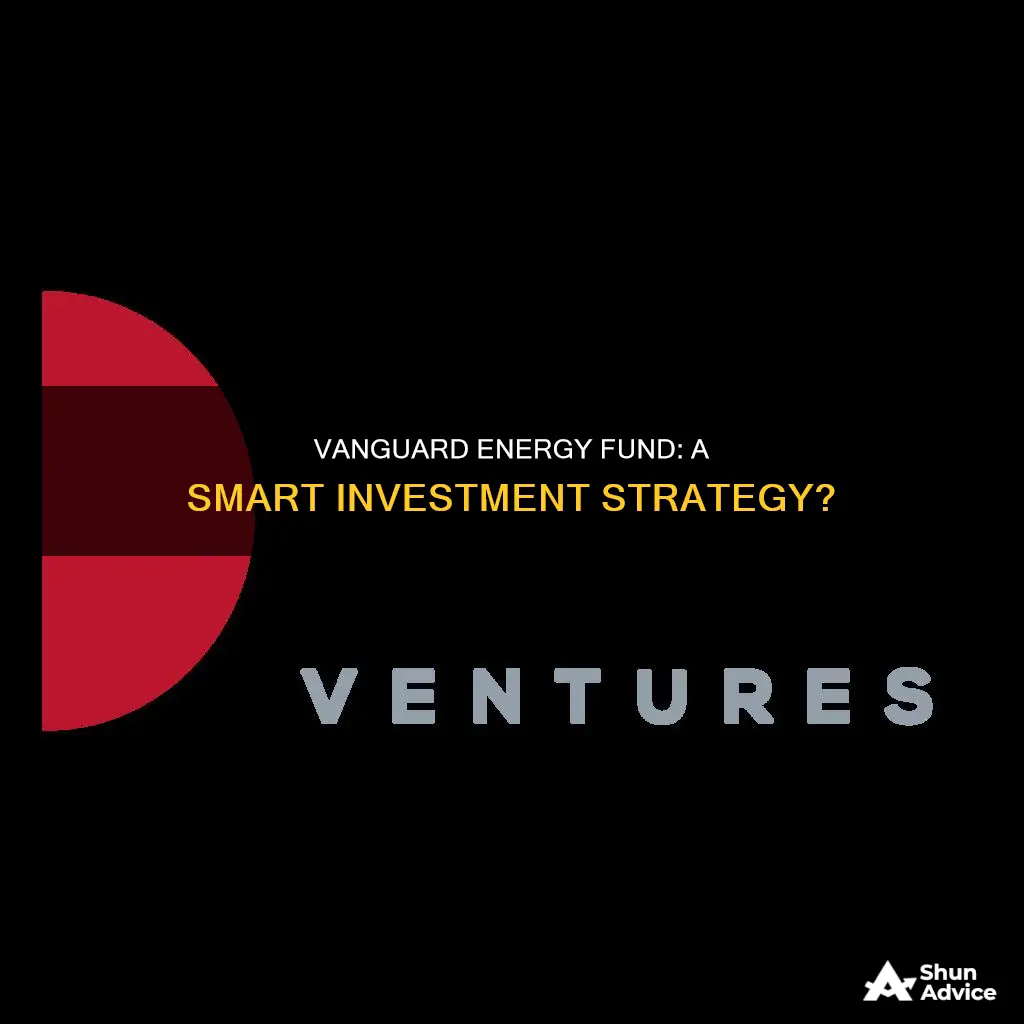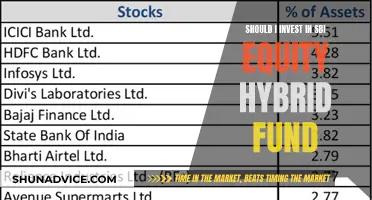
The Vanguard Energy Fund is an excellent choice for investors seeking exposure to the energy sector, particularly oil, natural gas, and coal. With assets totaling $5.65 billion invested in 59 holdings, the fund has delivered solid returns over the years, outperforming its peers. Vanguard's low-cost approach, experienced fund managers, and focus on energy make it a compelling option for those considering investing in the energy sector. However, it's important to remember that investing in the energy sector carries risks and volatility, and past performance does not guarantee future results.
| Characteristics | Values |
|---|---|
| Overall Score | 7.5/10 |
| Assets | $5.9 billion |
| Expense Ratio | 0.440% |
| Minimum Initial Investment | $3,000 |
| Admiral Shares Version Minimum Investment | $50,000 |
| Risk | Below average |
| Return | High for trailing 3 and 5 years, above average for trailing 10 years |
| Trailing 1-Year Return | 8.61% |
| Trailing 3-Year Return | 25.82% |
| Trailing 5-Year Return | 2.28% |
| Trailing 10-Year Return | 0.08% |
| Launch Date | May 1984 |
| Holdings | 59 |
| Top Holdings | Targa Resources Corp, Shell PLC ADR |
What You'll Learn

Vanguard Energy Fund's performance and outlook
Vanguard Energy Funds Performance and Outlook
Vanguard Energy Fund (VGENX) is an excellent source of energy and utilities exposure in one package. The fund has a Morningstar Medalist rating and falls into Morningstar's equity energy category. It has a narrow focus on the energy sector, including oil, natural gas, and coal, and has been in operation since May 1984. As of November 27, 2023, the fund held assets totalling almost $5.65 billion invested in 59 different holdings.
The fund's performance has been strong, with a 8.61% return over the past year, 25.82% over three years, 2.28% over five years, and 0.08% over the past decade. The fund's expense ratio is 0.41%, which is considered low by Morningstar, and the risk is below average compared to other funds in its peer group.
The Vanguard Energy ETF (VDE) is another option for investors seeking exposure to the oil sector. This fund is passively managed and tracks the MSCI US Investable Market Energy 25/50 Index, investing in a wide range of oil companies, including industry giants like ExxonMobil and Chevron. Its performance has been less stellar, with a five-year average return of -2.00% and a ten-year average return of 1.47%. However, it has relatively low management fees, with a 0.10% expense ratio.
The Vanguard Energy Index Fund (VENAX) seeks to track the performance of the MSCI US Investable Market Index (IMI)/Energy 25/50 and is non-diversified. It has delivered strong returns, with a five-year performance of 9.69% and a ten-year performance of 3.13%. The fund's fees are low compared to others in the same category, with an expense ratio of 0.10%.
Overall, Vanguard Energy Funds offer investors a range of options to gain exposure to the energy sector, with a focus on oil, natural gas, and coal. While the performance of these funds has varied, they have generally delivered strong returns over the long term, and their fees and expense ratios are competitive.
Ethical Fund Investment: Getting Started and Doing Good
You may want to see also

Vanguard Energy ETF's top holdings
The Vanguard Energy ETF (VDE) offers investors a diverse play on the oil sector. The fund's top 10 holdings include major oil companies like ExxonMobil Corp., Chevron Corp., ConocoPhillips, EOG Resources Inc., and Schlumberger Ltd. These companies are involved in various oil-related businesses, including the construction and provision of oil rigs, drilling equipment, and energy-related services. About 40% of the fund's total holdings are in the integrated oil and gas sector, which includes natural gas and coal energy products.
The Vanguard Energy ETF is passively managed and tracks the MSCI US Investable Market Energy 25/50 Index, composed of stocks from companies of various sizes in the energy sector. The fund's holdings are weighted by market capitalization, with larger companies having a bigger position in the fund. As of December 17, 2021, the fund had $6.7 billion in assets under management (AUM) and was trading at $75.14 per share.
The Vanguard Energy Fund (VGENX) is another option for investors seeking exposure to the energy sector. This fund has a narrower focus, investing solely in oil, natural gas, and coal, rather than companies that explore or distribute additional energy-related commodities. As of November 27, 2023, the fund had assets totaling almost $5.65 billion invested in 59 different holdings. The fund's top holdings include Marathon Petroleum Corp, Pioneer Natural Resources Co, and Williams Companies Inc.
Smartly Invest 50 Lakhs in Mutual Funds: A Beginner's Guide
You may want to see also

Vanguard Energy Fund's risk and return
When considering investing in Vanguard Energy Funds, it is important to assess the associated risks and potential returns. Here is an overview of the key points:
Risk
Vanguard Energy Funds, including the Vanguard Energy ETF (VDE) and the Vanguard Energy Index Fund, carry certain risks that potential investors should be aware of. One notable risk is the fund's narrow focus on the energy sector, particularly oil, natural gas, and coal. This narrow focus can make the fund more susceptible to downside risk and volatility compared to a broadly diversified stock fund. The energy sector is known for its high risk and high-cost nature, which can impact the fund's performance.
Additionally, the Vanguard Energy ETF has a significant presence in industry giants, such as ExxonMobil and Chevron. While some investors value the relative stability of these large companies, others may prefer to avoid funds that heavily invest in industry behemoths.
Return
In terms of returns, the Vanguard Energy Funds have had mixed performance. As of December 2021, the Vanguard Energy ETF (VDE) had a five-year average return of -2.00% and a ten-year average return of 1.47%. However, it is important to note that the fund held up well during the oil crisis in 2016, demonstrating resilience during volatile oil prices.
On the other hand, the Vanguard Energy Index Fund has shown more positive returns. As of October 2024, the fund had returned 51.61% over the past three years, 9.69% over the past five years, and 3.13% over the past decade.
Overall, when considering investing in Vanguard Energy Funds, it is crucial to assess your risk tolerance and investment goals. While the funds offer exposure to the energy sector, they carry the inherent risks associated with the industry. The returns have been varied, and it is essential to evaluate the funds' performance over different time periods to make an informed decision.
Venture Capital Funds: Diversifying Your Investment Portfolio
You may want to see also

Vanguard Energy Fund's management fees
The Vanguard Energy Fund has an expense ratio of 0.41% or 0.46% depending on the source. Morningstar classifies this as low. The fund's admiral shares version offers an expense ratio of 0.33% with a $50,000 minimum investment.
The Vanguard Energy ETF has a management fee of 0.07% and other expenses of 0.03%, making up a modest expense ratio of 0.10%.
The Vanguard Energy Index Fund has an expense ratio of 0.10%.
Vanguard's average mutual fund and ETF expense ratio is 82% less than the industry average. The average Vanguard mutual fund expense ratio is 0.09%, while the industry average is 0.50%. The average Vanguard ETF and mutual fund expense ratio is 0.08%, compared to an industry average of 0.44%.
Vanguard does not charge a commission to buy or sell its mutual funds and ETFs online. However, a $25 annual fee applies to each brokerage and mutual-fund-only account. This fee can be avoided under certain circumstances, such as having at least $5 million in qualifying Vanguard assets or signing up for e-delivery of statements and other important account updates.
Some Vanguard mutual funds charge fees when buying and selling shares to cover higher transaction costs and discourage short-term trading. These fees vary from 0.25% to 1.00% of the transaction amount.
Mutual Fund Investment: Timing and Location Strategies
You may want to see also

Vanguard Energy Fund's suitability for your portfolio
Vanguard Energy Funds are a good option for investors seeking direct exposure to the energy sector, particularly oil, natural gas, and coal. The funds predominantly invest in large, mid-size, and small U.S. companies within the energy sector, with a small percentage of foreign holdings. Vanguard Energy Funds can be an excellent choice for investors who want a hybrid of energy and utilities exposure in a single investment.
The Vanguard Energy Fund (VGENX) is a mutual fund with a Morningstar rating of 7.5/10. It has a low expense ratio of 0.41%, or 0.33% for the admiral shares version with a higher minimum investment. The fund's risk is considered below average for the trailing three and ten years, and it has returned 8.61% over the past year, 25.82% over three years, and 2.28% over five years. However, its narrow focus on the energy sector can subject it to more downside risk and volatility compared to broadly diversified stock funds.
The Vanguard Energy ETF (VDE) is an exchange-traded fund that offers a diverse play on the oil sector. It has a low expense ratio of 0.10%, making it a relatively low-cost investment option. The fund's recent performance has been less attractive, with a five-year average return of -2.00% and a ten-year average return of 1.47%. However, during the oil crisis in 2016, the fund held up well compared to oil futures funds, declining by just over 8%.
The Vanguard Energy Index Fund (VENAX) seeks to track the performance of the MSCI US Investable Market Index (IMI)/Energy 25/50. It has low fees compared to similar funds, with an expense ratio of 0.10%. The fund's risk is considered above average, and it has returned -1.23% over the past year, 51.61% over three years, and 9.69% over five years.
In summary, Vanguard Energy Funds can be a suitable addition to your portfolio if you are seeking exposure to the energy sector, particularly oil and gas. These funds have generally performed well over the past few years, and some have held their value during volatile periods. However, it is important to note that the energy sector can be subject to significant volatility, and investing in these funds may carry more downside risk than investing in broadly diversified stock funds.
Invest in Mutual Funds: Bank as a Gateway
You may want to see also
Frequently asked questions
The minimum initial investment for the Vanguard Energy Fund is $3,000.
The Vanguard Energy Fund's expense ratio is 0.41 percent, which is considered low by Morningstar.
The fund has returned 8.61 percent over the past year, 25.82 percent over the past three years, 2.28 percent over the past five years, and 0.08 percent over the past decade.







